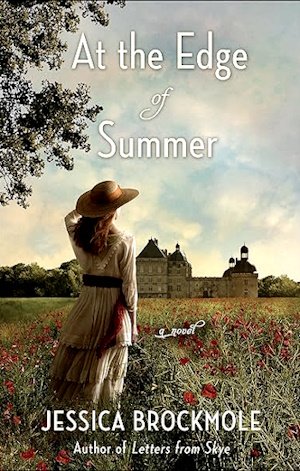He didn’t see me as an insubstantial girl, like the rest of the world, chipping as easily as china, wilting like a hothouse orchid. He wrote to me like an equal, he talked to me like a friend.
“Luc,” I said, to remind him we were beyond the “monsieurs” and “mademoiselles.” “I didn’t know.”
“I didn’t tell you.” Bede darted through the clearing, tongue wagging, and Luc looked away.
“Did you want me to think you someone else?”
“I remember your house in Scotland. It was filled with real wallpaper, not cobwebs or disrepair. Your father wore smart suits, your mother had silverware that matched. I’m sure you don’t want to hear about my woes.”
“You said you were exhausted. You said that you were weary with your life.” I took a step closer. “Can’t matching silverware be exhausting? Starched dresses and governesses? Empty dining tables?” Overhead, a rook screeched and I wrapped my arms around my chest. “Do you think it’s not exhausting to be a fifteen-year-old girl who nobody wants?”
“I want you,” he said quickly, unthinkingly, and something skipped in my heart. He closed his eyes, just briefly. When he opened them again, they were clear. “I want you around.”
I let my arms drop.
“Would you like to come sit down?” he asked, almost shyly. “I’ll share my oranges.”
“We won’t argue again, will we?”
There was a little flash of a smile. “Only if you won’t try to run away again. If you do, I might start an argument to give you an opportunity to come back and shout at me.”
“Monsieur…Luc…it is a deal.” I held out my hand.
He hesitated for a handful of breaths. But finally he stepped closer and he took my hand. His was warm, rough, and sticky from the oranges. It was smudged red on the knuckles from his sketching. His bare wrist was sprinkled with freckles. It felt nice.
He noticed me noticing. “Right,” he said. “It’s a deal.” He shook my hand vigorously, then loosened his grip. As he pulled his hand back, he unrolled his cuffs and tugged them back down over his wrists.
“Right,” I repeated softly.
He cleared his throat. “Anyway, this isn’t a place to fight.” He tipped his head up, to the skim of sunlight falling through the trees. “It’s a place of refuge.”
The clearing was as still as a cathedral. “It is.”
“This was always one of my favorite places to come as a boy when Maman and Papa were arguing. I’d steal away with something from the kitchen and a stack of history books and hide out here until things quieted down.”
“Did they fight often?”
“As often as anyone, I suppose.” He went to where his coat lay spread beneath the tree. “Maman would shout that Papa wasn’t paying her enough attention, Papa would shout back that she clung too close, like a vine of ivy—that’s exactly what he used to say—then Maman would declare that she’d have to tattoo her breasts like a Samoan islander before he’d notice her.”
I wonder if he’d realized he’d used the word “breast.” I pushed on my suddenly hot cheeks with one hand. “Astonishing.”
“Of course, the rows only lasted as long as that. They’d shout, they’d cry, but then Papa would come to sit next to Maman on the sofa and everything would be forgotten. He always said that she fought as well as any French woman. He was quite admiring.”
“So they weren’t real arguments, then.”
“What is real? The fights came when one of them had something to say to the other.” He shrugged. “Sometimes Papa can be too preoccupied and sometimes Maman can be too smothering.”
“My parents never fought.” It wasn’t, I supposed, a Scottish thing to do. I shrugged like he had, hoping I looked as casual. “Really, they just quietly ignored one another.”
I followed him back towards the plane tree, in front of a larger cave entrance carved over the top with 143 Carrière in rough, blocky letters. The clearing around the tree was grassless, covered over with leaves from last autumn. A solemn owl guarded over us from above.
“What is this place?” I asked, this corner of the woods filled with cool air and violets. Along the edges of the stones, poppies and purple-blue cornflowers clustered in the spots of sun. It smelled like rain and snow and summer all run together.
“Le Bois des Fées.” He shook the leaves from his coat and spread it down again for me. “At least that’s what I always called it.”
“What does that mean?”
“The Fairy Woods.” He lowered his voice dramatically. “Where little boys are tossed down wells like wishes.”
“What?”
“Never mind.”
Bede dashed in and out of the clearing, stopping to sniff the orange peels as he passed.
I dropped to my knees onto Luc’s brown jacket and sat. “And in ‘The Fairy Woods,’ are the caves for trollish treasure?”
“Not caves.” He tossed a stick for Bede. “Quarries.”
“For stone?”
“This area here around Enété village, it was a quarry centuries ago. All of the white stones you see in the houses between here and Soissons, they came from the ground beneath us.”
“The stones of Mille Mots?” The château, aching white above the river. “They came from here?”
“I hope so.” He dug into his rucksack and pulled out a pair of small Spanish oranges. “Brindeau farm, on the ridge above here, is older than that. It used to be an abbey farm back in the days of Charles the Wise. At some point the monks discovered the granite below and it was a quarry ever since.”
I dug a fingernail into the orange peel. “Did they run out of stone?”

























